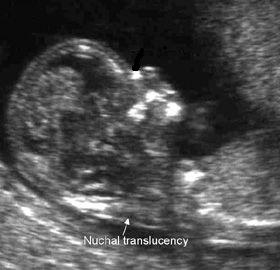What is a Nuchal Translucency Scan?
 A Nuchal Translucency Scan ( NTS) is a screening test to check for Trisomy 21 (Down syndrome), Trisomy 18 (Edwards’s Syndrome), Trisomy 13 (Palau’s Syndrome).
A Nuchal Translucency Scan ( NTS) is a screening test to check for Trisomy 21 (Down syndrome), Trisomy 18 (Edwards’s Syndrome), Trisomy 13 (Palau’s Syndrome).
An ultrasound scan is done between 11.5 and 13.5 weeks of pregnancy where there is measurement of the amount of fluid in the skin at the back of the baby’s neck. It is usually performed through the abdominal wall but sometimes it is necessary to do an internal (vaginal) scan. The ultrasound has no known harmful effects on the mother or the baby.
All babies at this stage in pregnancy have some fluid in this area, but a baby with Trisomy 21 (Down syndrome), Trisomy 18 (Edward’s Syndrome), Trisomy 13 (Palau’s Syndrome) will have more fluid than normal.
This ultrasound also checks for the presence of your baby’s heartbeat, single or twin pregnancy, dates, exclusion of some other abnormalities such as exomphalos, holoprosencephaly, some heart abnormalities and megacysis.
Is a Nuchal Translucency scan accurate?
Yes about 70%.
The accuracy is increased to about 92% if combined with a blood test called the maternal serum screening test.
The maternal serum screening test measures the amount of two different proteins called PAPP-A and beta HCG which occur naturally in the mother’s blood during pregnancy. A change in the level of these proteins may indicate that there is an increased risk that the baby has Down syndrome.
What does a ‘high risk’ result mean?
1 in 20 women will have a ‘high risk’ result. This does not necessarily mean that there is a problem in your unborn baby. It means that further tests should be considered to see if there is a problem with your baby. The ‘gold standard’ further checking is a chorionic villus sampling (CVS) or amniocentesis. Today a Noninvasive Prenatal Test ( NIPT) is usually done in preference to a CVS or amniocentesis as it is > 99% accurate and have no risk of causing miscarriage
What determines the cut off for ‘high risk’?
How ‘high risk’ is usually defined is when the risk of miscarriage with a CVS or amniocentesis is less than the risk of the chromosome abnormality.
What does a ‘low risk’ of Down syndrome result mean?
19 out of 20 women tested will have a ‘low risk’ result. This means that the risk of having a baby with Down syndrome is very low but does not mean that there is no risk.
It is very important to realise that the NTS is checking for for Trisomy 21 (Down syndrome), Trisomy 18 (Edwards’s Syndrome), Trisomy 13 (Palau’s Syndrome) and that a ‘low risk’ result does not ensure that your baby is free of other chromosome problems or non-chromosomal birth defects. Some non-chromosomal defects can be checked by the ultrasound.
Does the test pick up any other birth defects?
Yes. Some major cardiac defects, skeletal defects and abdominal defects and other chromosomal abnormalities can also be suspected.
Do all pregnant women have an NTS?
The decision whether or not to have baby chromosome checking is entirely up to you. You need to ask yourself whether you would do anything with result. If no then you need to carefully consider why you would have the testing done. A decision to have testing as you need to know ‘to be prepared’ but you have no intention of having a termination of pregnancy if a chromosome abnormality is diagnosed is not recommended. To know there is problem does not prepare you but results in an extremely anxious filled pregnancy. You will be unset about the findings, gravitate in your thinking to the worst scenario with the chromosome problem and often be very fearful of delivery, when the chromosome disorder is confirmed..
The NIPT is now by far a much more popular screening test than the NTS as it is more accurate. As well the NIPT checks for sex chromosome disorders and so the sex of the baby. This is not possible with the NTS. The NIPT is done at an earlier gestation than the NTS.
While the NTS and the maternal serum screening test are noninvasive, if the result was abnormal you would be tempted to have an amniocentesis or CVS to check. These are invasive tests and carry a small risk of miscarriage (1 in 200 to 300). Alternatively, you can decide to have an NIPT screening test to check.
Where do I get the NTS done?
I recommend your NTS be done by an ultrasound unit run by obstetricians who have subspecialised in pregnancy ultrasound and early foetal assessment. They are more accurate. I recommend it be done by Sydney Ultrasound for Women (Norwest Private Hospital bookings) or San Ultrasound for Women (San hospital bookings).
I will give you a pathology referral to DHM pathology for the serum hormone checking. If you have this done a few days prior to your NTS the ultrasound unit will have the serum result and so can give you the full result on the day you get the NTS done.
See also

